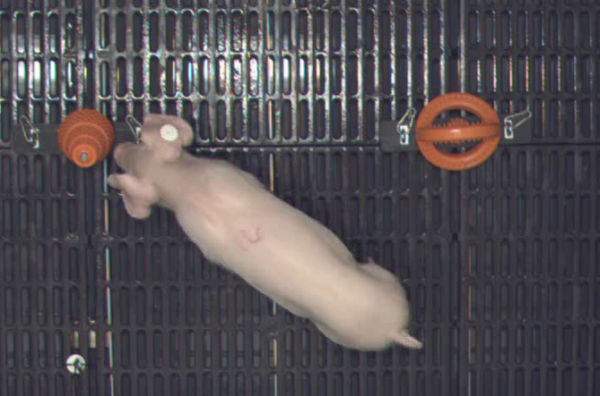New Study Supports Link Between Gut Health & Brain Development

A pig explores objects in an arena designed for research on piglet brain development at the U of I Piglet Nutrition and Cognition Lab. Stephen Fleming/U of I Piglet Nutrition and Cognition Lab
Prebiotics are a class of small, indigestible fiber molecules present in human breast milk and known to promote growth of good bacteria in the gut. Now, a new study from the University of Illinois involving piglets suggests prebiotics may also improve learning and memory.
The findings have implications for creators of infant formula because “pretty much all formula companies agree that breastmilk is the benchmark that we need to meet with infant formulas,” says U of I neuroscience graduate student Stephen Fleming.
“What we want to do with the infant formula is create a formula that contains prebiotics that are also beneficial in similar ways as the prebiotics that naturally occur in human milk,” Fleming adds.
He and his colleagues at the U of I Piglet Nutrition and Cognition Lab use baby pigs as a model for studying human growth and development. Piglets, Fleming says, are superior to rodents for these studies owing to the similarities between piglets and human babies when it comes to their digestive systems, behavioral responses and brain development.
The team gave a group of 24 baby pigs a cow’s milk-based infant formula containing two prebiotics that are added to some infant formulas: the synthetic carbohydrate polydextrose and the naturally occurring galactooligooligosaccharide.
When the piglets were 25 days old - which is comparable to the human age of 4 months - they studied their behavior and brain chemistry. They found that pigs on prebiotics had better memory and showed more exploratory behavior, compared to piglets who received the formula alone.
The study involved placing the piglets in an arena with dog toys placed in the center, including some they had seen before and others that were new to them. If the piglet spent more time with a new toy, that signaled to the researchers that the piglet recognized it as new. The so-called “novel object recognition” test is a way to test memory. At the end of the study, the team also collected and analyzed intestine, blood and brain tissues to study differences in neurochemistry between the two groups.
The results add to the growing evidence that suggest a link between the gut and the brain, which the researchers say makers of infant formula should strongly consider.
Additional work is needed to determine if the same benefits would be seen in humans, and to understand the long-term effects of supplemention with prebiotics.
The study was published in the journal “Nutritional Neuroscience” and was funded by Mead Johnson Nutrition. You can find a link to the full study here.
Follow Christine on Twitter: @CTHerman
